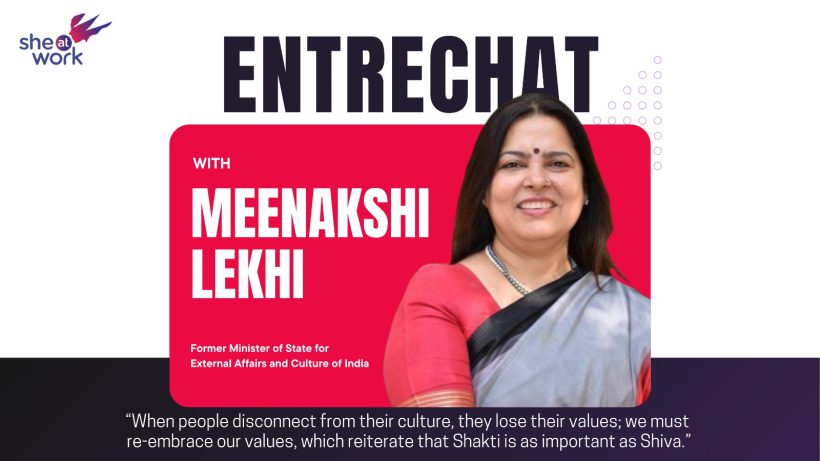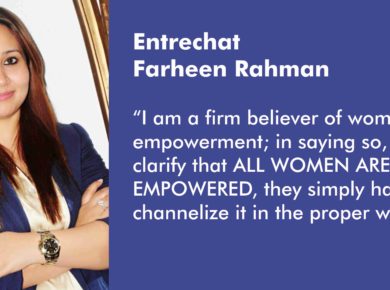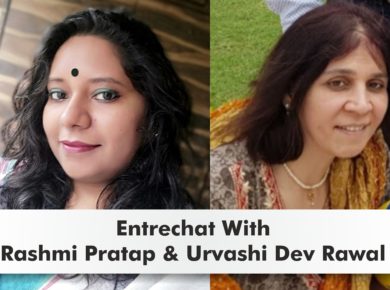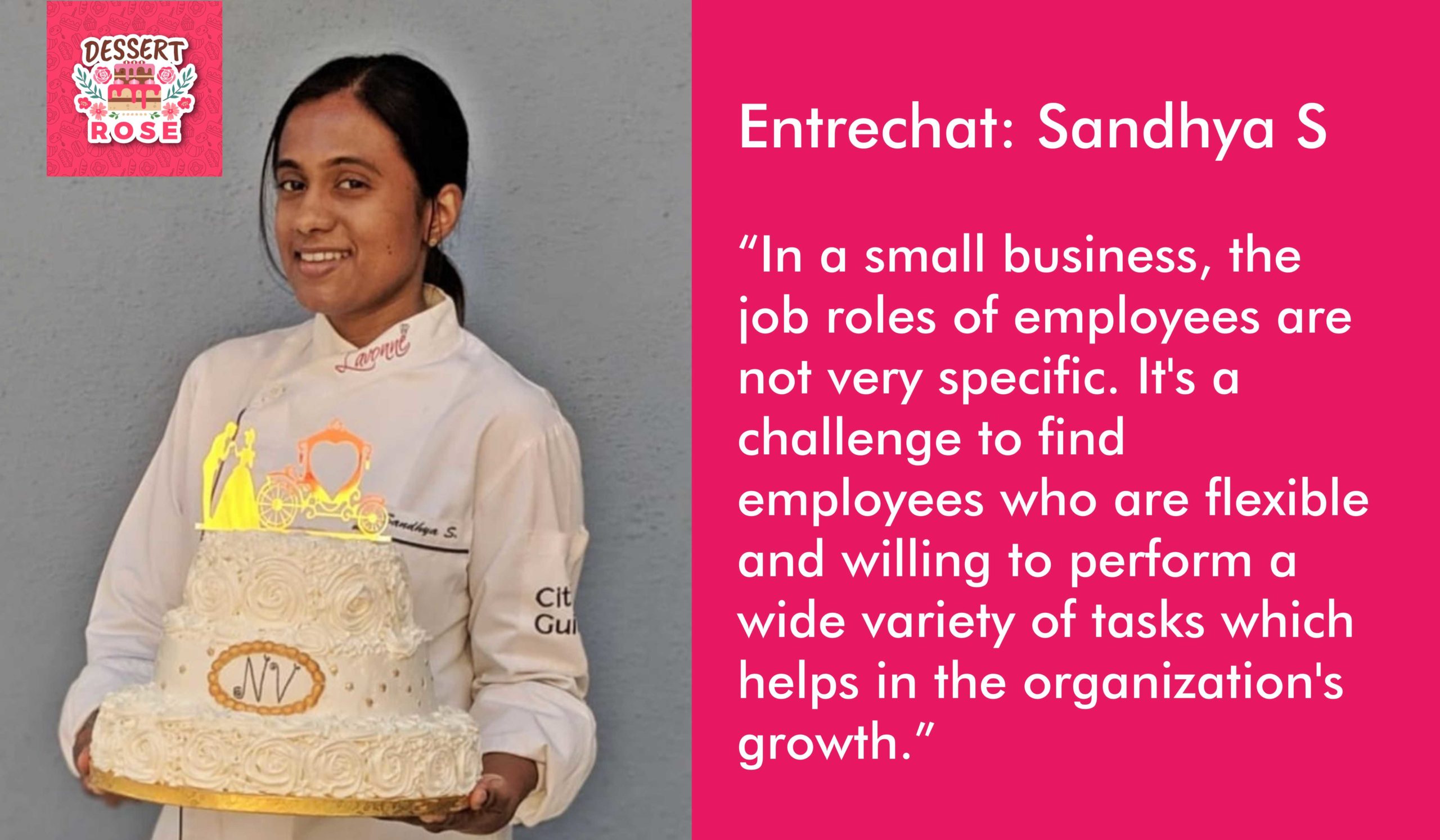There cannot be true democracy unless women’s voices are heard. There cannot be true democracy unless women are given the opportunity to take responsibility for their own lives.’ This statement summarizes the thought process of India as a nation taking huge strides towards progress and growth. To walk the talk, India has never shied away from entrusting women leaders with the responsibility of carrying forward its rich cultural legacy and ethos of continued growth. Team SheAtWork has the honour of conferring with one such woman leader, Ms. Meenakshi Lekhi.
Ms. Lekhi has served as the Minister of State for External Affairs and Culture of India. She was a Member of Parliament from New Delhi Parliamentary constituency. She is also a lawyer in the Supreme Court of India.
A published author, her articles adorn journals, periodicals and newspapers on socio-political issues, and she participates in various television shows on matters on national and international importance. An eloquent debater, Ms. Lekhi has participated in numerous debates on matters of national importance in the Lok Sabha, such as debates on “intolerance” in India and the Triple Talaq Bill. She has also distinguished herself as an active participant in the various parliamentary processes and was awarded with the “Best Debut Women Parliamentarian” award by Lokmat in 2017.
Besides, she has also been a social activist and has been associated with several institutions, including the National Commission for Women, Sakshi, NIPCD and several other organisations which are known for being protectors of the rights of women and children in the country. A crusader for women’s rights, she has also practised in a range of forums across India and handled a range of issues pertaining to women in the courts, such as domestic violence, family law disputes and most importantly the issue of permanent commission of the lady officers in the armed forces. Additionally, Ms. Lekhi has been a part of the Drafting Committees for Bills like “Women’s Reservation Bill” and “Sexual Harassment of Women at Workplace (Prevention, Prohibition and Redressal) Bill”. The latter was passed by the Parliament.
Ques. A lot has been achieved in the sphere of gender equity so far. Do you think that there is more that can be done?
Ans. When people disconnect from their culture, they lose their values – unfortunately this is the history of our country because our culture has been invaded numerous times for lengthy spans of time. Resultantly, we lost touch with our pure culture and many impurities seeped in – we are now paying the price for those impurities.
Gradually the cleansing of Ganga and Yamuna is happening; and as rivers are a symbol of our culture, this cleansing is very important. This is symbolic of our effort to return to our purest form of culture, as it was earlier. Thus, we will re-embrace earlier thought processes, and gradually re-affirm that Shakti is as important as Shiva.
Hence, we need to reintroduce ourselves with a modern approach, integrating traditional values and leadership ethics to adopt gender equity. India is rapidly taking strong strides towards gender equity and it is noteworthy that everyone faces resistance, regardless of their gender. It is heartening to observe that Indian men are very accepting of women leadership.
Ques. Gender budgeting allocation in our nation has increased substantially from 2014 to 2025. While this reflects the Government’s intent of creating gender equity, the current world of Indian politics has only two women Chief Ministers. Do you think women need a stronger representation in Indian politics?
Ans. Sometimes we need to tweak systems to expedite an ongoing process; so, while there is acceptance of women, the interested gender pool is missing. You cannot be in politics simply because you are a woman! Only if you are interested, capable and zealous about politics, can you be given a seat at the table. I for one, have always wanted to be acknowledged for my work and not be simply accepted because I am a woman. Women should be made to compete, made to work hard and they should not be given any special liberties – the opportunities should be equal but the decisions too need to be made without any biases. Undeserving men or women should not be accepted – only the people suited for the role should be allowed an entry – regardless of gender.
In politics building the critical mass consisting of women, is slow, and the Women’s Reservation Bill will expedite it. Fortunately, some political parties have been striving for gender equity for quite some time now. Gender budgeting is a real concept for these political parties and they believe that it should be integral to all budgets and within every ministry.
Undeniably, it is essential to give women more respect, dignity and power in order to witness huge amounts of progress, prosperity and peace within the nation. In fact, for creating a balanced society, women should also be welcomed across all spheres of work. I am grateful to the honorable Prime Minister, because he has picked up all these ideas and is trying to bring them to a consequence.
Ques. One of the ways of empowering people is through entrepreneurship and India has become the start-up capital of the world. Yet, why aren’t women founders dominating India’s start-up boom?
Ans. There are a few women-led start-ups which are huge successes. But again, it all boils down to creating the critical mass, as I have stated earlier. There are about 45% of women in STEM but a very small percentage get into entrepreneurship after graduating. Uncertainties pertaining to businesses, family responsibilities, cultural background, biological challenges, children and other social norms hold women back.
That said, my idea of success is not reaching places or positions, it is being able to do what you wish to do. Entrepreneurship is tough and women often choose family over work, but it’s a choice they make! On the flip side, sometimes societal/familial pressures also force women to take up jobs or entrepreneurship – and if they are happy with it- so be it! Again, there are ‘lakhpati didis’ from rural backgrounds making 12 lakhs annually and they are happy. Compelling them to become millionaires is distasteful. In a nutshell, we must allow women the space where they are comfortable and can become economically independent. If they are happy and comfortable doing what they are doing, I think they are successful women.
Ques. What is the biggest challenge you faced on your career-path, which can be attributed to some kind of gender bias in the society?
Ans. Fathers today are more accepting of their daughters’ choices and lifestyles than in the past. In my growing up years I did have difference of views with my father; while he was perhaps only trying to be protective about me, he often opposed my decisions – to study Law, for one. This made me into a rebellious child. Although he did give into my wishes, he was genuinely worried about who would marry me if I broke societal norms drafted for girls! As men, fathers understand society from a manly perspective and they worry about the well-being of their daughters, once they have stepped out of set patterns.
Today, society is more supportive abut women and their wishes. Men and women together create a balance – thus reflecting what our culture teaches us. So, men who are seeped in their culture, would be welcoming and accepting of the wishes of women. I believe, gender equality is not about men vs women – it is about creating a balance between men and women – because they are two parts which create a whole when brought together.










